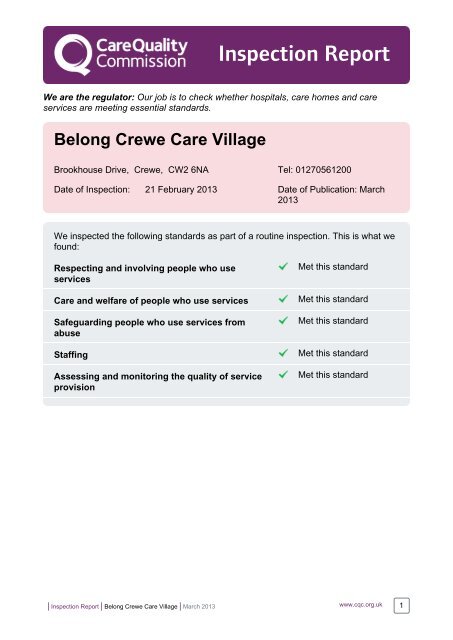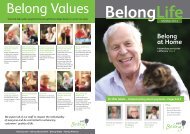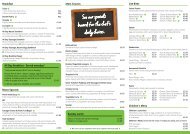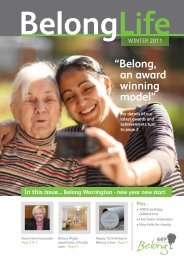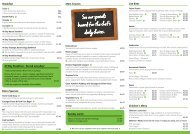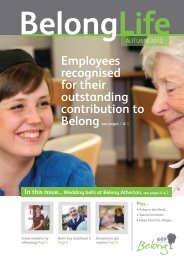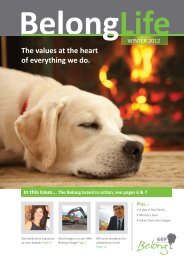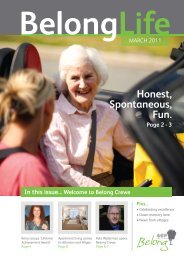Care Village Inspection Report March 2013 - Belong
Care Village Inspection Report March 2013 - Belong
Care Village Inspection Report March 2013 - Belong
You also want an ePaper? Increase the reach of your titles
YUMPU automatically turns print PDFs into web optimized ePapers that Google loves.
<strong>Inspection</strong> <strong>Report</strong><br />
We are the regulator: Our job is to check whether hospitals, care homes and care<br />
services are meeting essential standards.<br />
<strong>Belong</strong> Crewe <strong>Care</strong> <strong>Village</strong><br />
Brookhouse Drive, Crewe, CW2 6NA Tel: 01270561200<br />
Date of <strong>Inspection</strong>: 21 February <strong>2013</strong> Date of Publication: <strong>March</strong><br />
<strong>2013</strong><br />
We inspected the following standards as part of a routine inspection. This is what we<br />
found:<br />
Respecting and involving people who use<br />
services<br />
<strong>Care</strong> and welfare of people who use services<br />
Safeguarding people who use services from<br />
abuse<br />
Staffing<br />
Assessing and monitoring the quality of service<br />
provision<br />
Met this standard<br />
Met this standard<br />
Met this standard<br />
Met this standard<br />
Met this standard<br />
| <strong>Inspection</strong> <strong>Report</strong> | <strong>Belong</strong> Crewe <strong>Care</strong> <strong>Village</strong> | <strong>March</strong> <strong>2013</strong> www.cqc.org.uk 1
Details about this location<br />
Registered Provider<br />
Registered Manager<br />
Overview of the<br />
service<br />
Type of service<br />
Regulated activities<br />
CLS <strong>Care</strong> Services Limited<br />
Miss Caroline Ray<br />
<strong>Belong</strong> Crewe <strong>Care</strong> <strong>Village</strong> is a purpose built complex that<br />
provides modern accommodation for people who require<br />
nursing or personal care and is registered to care for up to<br />
67 older people. The village is located in a residential area of<br />
Crewe and local amenities such as a medical centre,<br />
chemist, bus stop and shop are within a short walking<br />
distance. There are six separate households, each able to<br />
accommodate 10 or 12 people who require differing levels of<br />
care, support and treatment.<br />
<strong>Care</strong> home service with nursing<br />
Accommodation for persons who require nursing or personal<br />
care<br />
Diagnostic and screening procedures<br />
Treatment of disease, disorder or injury<br />
| <strong>Inspection</strong> <strong>Report</strong> | <strong>Belong</strong> Crewe <strong>Care</strong> <strong>Village</strong> | <strong>March</strong> <strong>2013</strong> www.cqc.org.uk 2
Contents<br />
When you read this report, you may find it useful to read the sections towards the back<br />
called 'About CQC inspections' and 'How we define our judgements'.<br />
Summary of this inspection:<br />
Page<br />
Why we carried out this inspection 4<br />
How we carried out this inspection 4<br />
What people told us and what we found 4<br />
More information about the provider 4<br />
Our judgements for each standard inspected:<br />
Respecting and involving people who use services 6<br />
<strong>Care</strong> and welfare of people who use services 7<br />
Safeguarding people who use services from abuse 9<br />
Staffing 10<br />
Assessing and monitoring the quality of service provision 11<br />
About CQC <strong>Inspection</strong>s 13<br />
How we define our judgements 14<br />
Glossary of terms we use in this report 16<br />
Contact us 18<br />
| <strong>Inspection</strong> <strong>Report</strong> | <strong>Belong</strong> Crewe <strong>Care</strong> <strong>Village</strong> | <strong>March</strong> <strong>2013</strong> www.cqc.org.uk 3
Summary of this inspection<br />
Why we carried out this inspection<br />
This was a routine inspection to check that essential standards of quality and safety<br />
referred to on the front page were being met. We sometimes describe this as a scheduled<br />
inspection.<br />
This was an unannounced inspection.<br />
How we carried out this inspection<br />
We looked at the personal care or treatment records of people who use the service,<br />
carried out a visit on 21 February <strong>2013</strong>, observed how people were being cared for and<br />
checked how people were cared for at each stage of their treatment and care. We talked<br />
with people who use the service, talked with carers and / or family members and talked<br />
with staff.<br />
What people told us and what we found<br />
Not all the people we spoke to living at <strong>Belong</strong> Crewe were able to use words to tell us if<br />
they were happy with the way the service was run, and the way they were supported.<br />
People gave us the thumbs up or could indicate with a few words if they were happy. We<br />
were able to speak to people and observe their care as well as interactions between them<br />
and staff. People told us they enjoyed living at <strong>Belong</strong> Crewe and that staff respected their<br />
routines and lifestyle.<br />
One person living at <strong>Belong</strong> Crewe told us the importance of maintaining their<br />
independence was essential to them. They told us they were able to choose their own<br />
routines and lifestyles and these decisions were respected by staff. They said that staff<br />
supported them to maintain their independence but were quick to respond to their requests<br />
for assistance. They said, "The problem is my memory is getting worse. The staff keep me<br />
up to date and doesn't mind how many times you ask them something. At home I was not<br />
taking my tablets, I was forgetting. Now the staff help me I am feeling the benefit".<br />
We saw that people's health care needs were supported by staff who they commented<br />
were 'polite', 'friendly', 'I absolutely love them', 'such fun' and 'everyone knows your name<br />
even if you have only met them once'. Staff told us they were well trained and supported.<br />
We saw they were respectful of the needs of people living at the home.<br />
You can see our judgements on the front page of this report.<br />
More information about the provider<br />
Please see our website www.cqc.org.uk for more information, including our most recent<br />
judgements against the essential standards. You can contact us using the telephone<br />
number on the back of the report if you have additional questions.<br />
| <strong>Inspection</strong> <strong>Report</strong> | <strong>Belong</strong> Crewe <strong>Care</strong> <strong>Village</strong> | <strong>March</strong> <strong>2013</strong> www.cqc.org.uk 4
There is a glossary at the back of this report which has definitions for words and phrases<br />
we use in the report.<br />
| <strong>Inspection</strong> <strong>Report</strong> | <strong>Belong</strong> Crewe <strong>Care</strong> <strong>Village</strong> | <strong>March</strong> <strong>2013</strong> www.cqc.org.uk 5
Our judgements for each standard inspected<br />
Respecting and involving people who use services<br />
Met this standard<br />
People should be treated with respect, involved in discussions about their care<br />
and treatment and able to influence how the service is run<br />
Our judgement<br />
The provider was meeting this standard.<br />
People's views and experiences were taken into account in the way the service was<br />
provided and delivered in relation to their care.<br />
Reasons for our judgement<br />
We looked at the assessment records of a people who had moved into the home. We<br />
found that detailed information was gathered about the needs of people and that they were<br />
involved in providing information about their care and support needs. One person told us<br />
that they had been involved in providing information about their care and support plan and<br />
said, "The staff asked me lots of questions about the things I like, about what food I like<br />
and how I wanted to be helped. They asked me if I wanted a male or female carer and I<br />
said I don't mind as long as they didn't".<br />
The family member of a person living at the home said that they had been supported to<br />
help their relative choose the home and had been able to contribute to the care and<br />
support planning process. They said," We wanted mum to have an apartment but her<br />
memory deteriorated so quickly that was impossible so we chose the care side. This is a<br />
great concept, small units of people with plenty of staff. This is an excellent place. We<br />
have support from … the general manager in getting mum a place. I can be very picky but<br />
would have to be to find fault".<br />
<strong>Care</strong> and support plans were thorough; person centred and identified the persons' capacity<br />
for making choices. We looked at care records relating to three people living in the home.<br />
We found evidence to show that people's care and support plans were being reviewed and<br />
their views recorded regarding their needs and how they wanted their care and support to<br />
be provided. <strong>Care</strong> planning was person centred. This meant people were given an<br />
opportunity to manage their own care and maintain their independence. Staff key working<br />
arrangements were in place. This meant people were supported by the same staff that<br />
was familiar with their individual needs and choices.<br />
| <strong>Inspection</strong> <strong>Report</strong> | <strong>Belong</strong> Crewe <strong>Care</strong> <strong>Village</strong> | <strong>March</strong> <strong>2013</strong> www.cqc.org.uk 6
<strong>Care</strong> and welfare of people who use services<br />
Met this standard<br />
People should get safe and appropriate care that meets their needs and supports<br />
their rights<br />
Our judgement<br />
The provider was meeting this standard.<br />
People experienced care, treatment and support that met their needs and protected their<br />
rights.<br />
Reasons for our judgement<br />
During this visit we spoke to ten people and made observations of care practice. We found<br />
people were supported with personal care needs when they needed it, and requests for<br />
assistance were prompt. People were supported to eat and drink at leisure.<br />
People told us they were very happy at the home. Staff were always at hand to help them.<br />
We spoke to one person in their bedroom. They told us "I am getting a new hearing aid<br />
and a new doctor. Staff are helping me with my medication and I am feeling the benefit of<br />
that and am much better. What I like about here is that if where ever you go people know<br />
your name even if they have only met you once. That has helped me settle in quickly and I<br />
feel like I belong here because people care. I see the staff caring for other patients and<br />
they do that with respect. Staff are patient and take their time to explain things to you. I<br />
have never heard the other patients complain. The biggest compliment I can pay the staff<br />
is that I would be happy to end my days here ".<br />
We found that care and support plans focussed on the needs of people using the service.<br />
Guidance for staff was clear and written in a person centred way to reflect individual<br />
needs. Person centred planning tools such as one page profiles were used to support staff<br />
provide person centred care. Each person had a care and support plan called 'my life<br />
plan'. This provided staff with information about helping people with the health and<br />
personal care needs, maintaining their individual routines and personal preferences to<br />
their diet.<br />
We found care and support plans were very detailed. We found terms used for example<br />
'requires assistance' defined what that assistance would involve. <strong>Care</strong> plans were clear<br />
and guided staff on supporting people to make decisions about their care.<br />
Risk assessments were carried out. These were linked to peoples' welfare and safety.<br />
They identified who may be at risk of falling, developing pressure ulcers or who may not<br />
eat enough. Improvements were noted as staff were given guidance on how to manage<br />
known risks. We saw examples that routines were flexible to allow people to get up when<br />
they wanted to. People had options of a wide range of meals and dining facilities. People<br />
could eat in the units or at the bistro. People could order food from the bistro or have it<br />
sent from the kitchen or prepared in the units. We saw that high calorie snacks were<br />
provided throughout the day to people who expended energy as a result of their mental<br />
| <strong>Inspection</strong> <strong>Report</strong> | <strong>Belong</strong> Crewe <strong>Care</strong> <strong>Village</strong> | <strong>March</strong> <strong>2013</strong> www.cqc.org.uk 7
health needs or who could not remember if they had eaten. We saw if people got up later<br />
in the morning they could have a light snack before lunch.<br />
We saw that the care home had an equipped gym on site which was available for visiting<br />
physiotherapists to use to treat their patients and for people to use for exercise and<br />
mobility programmes.<br />
We spoke to the nurse that managed the health care needs of people at the home. They<br />
said that their role was supporting the care staff in the home and providing advice and<br />
guidance to them. They said they were the link between local general practitioners and<br />
community based health professionals. They said their job was made easy because of the<br />
competence of the staff who worked in the care home units. They said, "The staff here are<br />
brilliant. We have a great team of staff who are on the ball. I have done training with them<br />
so they can do the basic monitoring of people's health. I do the clinical observations but<br />
they can manage otherwise. If they need advice they call me and I will assess people<br />
based on what they tell me. I have every confidence in them and am not just saying that<br />
because I work here".<br />
| <strong>Inspection</strong> <strong>Report</strong> | <strong>Belong</strong> Crewe <strong>Care</strong> <strong>Village</strong> | <strong>March</strong> <strong>2013</strong> www.cqc.org.uk 8
Safeguarding people who use services from abuse<br />
Met this standard<br />
People should be protected from abuse and staff should respect their human<br />
rights<br />
Our judgement<br />
The provider was meeting this standard.<br />
People who use the service were protected from the risk of abuse, because the provider<br />
had taken reasonable steps to identify the possibility of abuse and prevent abuse from<br />
happening.<br />
Reasons for our judgement<br />
People said that they were safe living at the home and that their safety was ensured by<br />
staff. One person told us, "I have never seen anything that I need to be concerned about.<br />
It was explained to me that when I moved here if me health got worse then that was<br />
progression. Well I have improved and that is progression. I see the staff caring for all<br />
these patients. There are some patients who can be a bit rude at times but the staff are<br />
patients and take their time. They don't show anger or anything like that when they are<br />
caring for them".<br />
We looked at the staff training record. We found all staff had been trained in safeguarding<br />
adults. This meant staff had been supported to understand and recognise signs of abuse.<br />
We saw that all care staff had completed safeguarding adult's training and this included<br />
staff who had recently been employed and completed their induction.<br />
We spoke to staff. They told us they were confident to report any suspicion of abuse and<br />
were confident it would be dealt with appropriately. Staff were aware if the procedure on<br />
how to report allegations of neglect or abuse. Staff said the training was in depth and<br />
delivered good examples of what constituted neglect or abuse. One staff member said,<br />
"The training was quire hard hitting. The DVD's we saw we knew were actors but as a<br />
group we were all crying. It was upsetting but showed the reality of what can happen. I<br />
have never worked in a care home before and thought that things like that never<br />
happened. I thought the training was going to be common sense but was mistaken".<br />
Staff were provided with the provider organisation's zero tolerance to abuse called 'If you<br />
see something say something" information card. This offered staff guidance on how to<br />
report any concerns they had about the care of people living at the home and contained<br />
examples of indicators of abuse.<br />
| <strong>Inspection</strong> <strong>Report</strong> | <strong>Belong</strong> Crewe <strong>Care</strong> <strong>Village</strong> | <strong>March</strong> <strong>2013</strong> www.cqc.org.uk 9
Staffing<br />
Met this standard<br />
There should be enough members of staff to keep people safe and meet their<br />
health and welfare needs<br />
Our judgement<br />
The provider was meeting this standard.<br />
There were enough qualified, skilled and experienced staff to meet people's needs.<br />
Reasons for our judgement<br />
People living at the home commented that staff was 'polite', 'friendly', 'I absolutely love<br />
them', 'such fun' and 'everyone knows your name even if you have only met them once'.<br />
We looked at the staff rota for the week. This showed the number of staff on duty day and<br />
night at any one time but was not used as a judgement that staff was sufficient. Through<br />
our observations we saw that staffing levels at the time of the inspection were very good.<br />
Sufficient numbers of staff were on duty to ensure people's welfare and safety was<br />
promoted. We found care staff were deployed within the home to ensure continuing<br />
support for people. In addition to carers the provider employed staff for housekeeping<br />
duties and regular maintenance.<br />
The home had organised social activities on throughout the day. People had access to the<br />
bistro and the venue.<br />
The staff we spoke to were friendly and pleasant. They appeared to be well organised and<br />
had a good team spirit. They told us they were able to provide the support people required<br />
but found they always had time to provide personal care at times that suited people living<br />
at the home.<br />
We saw that staff could prepare meals on the units for people with their help. Staff were<br />
able to share meals with people and had time to do social activities with people. People<br />
said that staff were patient with them and were attentive to their needs. One person said,<br />
"My memory is getting worse and I am getting very frustrated with not being able to<br />
remember the simplest of things. My family visited earlier and they are happy that I have<br />
settled in. The staff are very helpful but they don't know me very well but they try their best.<br />
This lady brought me a drink as I was very thirsty. They are trying their best and being very<br />
patient". One staff member said, "We always have time to care for residents as they want.<br />
We always have the time to do the things that residents want us to do. We are not<br />
expected to rush. Residents decide what they want to do. Some residents are still in bed<br />
and when they want to get up we will help them. There are no set routines and if a resident<br />
gets up late before dinner we will make them a light snack so they are not too hungry and<br />
will still enjoy their meal".<br />
| <strong>Inspection</strong> <strong>Report</strong> | <strong>Belong</strong> Crewe <strong>Care</strong> <strong>Village</strong> | <strong>March</strong> <strong>2013</strong> www.cqc.org.uk 10
Assessing and monitoring the quality of service<br />
provision<br />
Met this standard<br />
The service should have quality checking systems to manage risks and assure<br />
the health, welfare and safety of people who receive care<br />
Our judgement<br />
The provider was meeting this standard.<br />
The provider had an effective system in place to identify, assess and manage risks to the<br />
health, safety and welfare of people who use the service and others.<br />
Reasons for our judgement<br />
We looked at the quality assurance system in place.<br />
We saw evidence that meetings were held for people using the service and relatives. The<br />
manager said the meetings were repeated in the evening and weekends so people living<br />
at the home and relatives had the opportunity to attend. We also saw minutes of the<br />
regular staff meetings held at the home and health and safety meeting.<br />
The manager had a daily meeting of staff that were in charge of each unit. These were<br />
attended by the senior managers. Information was gathered about any changes in<br />
people's needs, any visits from external professionals and anything significant relating to<br />
people using the service. The managers also shared important information that could be<br />
cascaded to staff in each unit.<br />
The manager undertook a range of audits at the home. These included; Medication, the<br />
environment, infection control, out of hour's manager visits and daily walks round audit by<br />
the manager. The home had a clinical governance audit based on the outcome areas of<br />
the essential standards and action plans were developed in accordance with the results.<br />
The provider also held meetings with managers of all the provider's registered care homes.<br />
This helped the provider organisation gather information from a range of different people<br />
and sources. We saw that the home was being very well maintained and facilities on site<br />
included a bistro, hair and beauty salon, internet café, exercise studio and The Venue<br />
where people can hold various functions such as parties and other activities.<br />
We saw that surveys for people using the service were sent out annually, but were<br />
returned to head office. The home manager received feedback form the surveys as well as<br />
the information being available on the provider's Internet site. Information from complaints<br />
was used to improve the serviced provided. For example comments were received about<br />
the service form people that use services. Comments were both positive and negative.<br />
The provider included theses comments in the report and how they had addressed them.<br />
The manager used a variety of ways to meet with people using services and their family<br />
members. There were coffee mornings, meetings with people that use services and an<br />
| <strong>Inspection</strong> <strong>Report</strong> | <strong>Belong</strong> Crewe <strong>Care</strong> <strong>Village</strong> | <strong>March</strong> <strong>2013</strong> www.cqc.org.uk 11
Alzheimer's Society café each month.<br />
| <strong>Inspection</strong> <strong>Report</strong> | <strong>Belong</strong> Crewe <strong>Care</strong> <strong>Village</strong> | <strong>March</strong> <strong>2013</strong> www.cqc.org.uk 12
About CQC inspections<br />
We are the regulator of health and social care in England.<br />
All providers of regulated health and social care services have a legal responsibility to<br />
make sure they are meeting essential standards of quality and safety. These are the<br />
standards everyone should be able to expect when they receive care.<br />
The essential standards are described in the Health and Social <strong>Care</strong> Act 2008 (Regulated<br />
Activities) Regulations 2010 and the <strong>Care</strong> Quality Commission (Registration) Regulations<br />
2009. We regulate against these standards, which we sometimes describe as "government<br />
standards".<br />
We carry out unannounced inspections of all care homes, acute hospitals and domiciliary<br />
care services in England at least once a year to judge whether or not the essential<br />
standards are being met. We carry out inspections of dentists and other services at least<br />
once every two years. All of our inspections are unannounced unless there is a good<br />
reason to let the provider know we are coming.<br />
There are 16 essential standards that relate most directly to the quality and safety of care<br />
and these are grouped into five key areas. When we inspect we could check all or part of<br />
any of the 16 standards at any time depending on the individual circumstances of the<br />
service. Because of this we often check different standards at different times but we<br />
always inspect at least one standard from each of the five key areas every year. We may<br />
check fewer key areas in the case of dentists and some other services.<br />
When we inspect, we always visit and we do things like observe how people are cared for,<br />
and we talk to people who use the service, to their carers and to staff. We also review<br />
information we have gathered about the provider, check the service's records and check<br />
whether the right systems and processes are in place.<br />
We focus on whether or not the provider is meeting the standards and we are guided by<br />
whether people are experiencing the outcomes they should be able to expect when the<br />
standards are being met. By outcomes we mean the impact care has on the health, safety<br />
and welfare of people who use the service, and the experience they have whilst receiving<br />
it.<br />
Our inspectors judge if any action is required by the provider of the service to improve the<br />
standard of care being provided. Where providers are non-compliant with the regulations,<br />
we take enforcement action against them. If we require a service to take action, or if we<br />
take enforcement action, we re-inspect it before its next routine inspection was due. This<br />
could mean we re-inspect a service several times in one year. We also might decide to reinspect<br />
a service if new concerns emerge about it before the next routine inspection.<br />
In between inspections we continually monitor information we have about providers. The<br />
information comes from the public, the provider, other organisations, and from care<br />
workers.<br />
You can tell us about your experience of this provider on our website.<br />
| <strong>Inspection</strong> <strong>Report</strong> | <strong>Belong</strong> Crewe <strong>Care</strong> <strong>Village</strong> | <strong>March</strong> <strong>2013</strong> www.cqc.org.uk 13
How we define our judgements<br />
The following pages show our findings and regulatory judgement for each essential<br />
standard or part of the standard that we inspected. Our judgements are based on the<br />
ongoing review and analysis of the information gathered by CQC about this provider and<br />
the evidence collected during this inspection.<br />
We reach one of the following judgements for each essential standard inspected.<br />
Met this standard<br />
This means that the standard was being met in that the<br />
provider was compliant with the regulation. If we find that<br />
standards were met, we take no regulatory action but we<br />
may make comments that may be useful to the provider and<br />
to the public about minor improvements that could be made.<br />
Action needed<br />
This means that the standard was not being met in that the<br />
provider was non-compliant with the regulation.<br />
We may have set a compliance action requiring the provider<br />
to produce a report setting out how and by when changes<br />
will be made to make sure they comply with the standard.<br />
We monitor the implementation of action plans in these<br />
reports and, if necessary, take further action.<br />
We may have identified a breach of a regulation which is<br />
more serious, and we will make sure action is taken. We will<br />
report on this when it is complete.<br />
Enforcement<br />
action taken<br />
If the breach of the regulation was more serious, or there<br />
have been several or continual breaches, we have a range of<br />
actions we take using the criminal and/or civil procedures in<br />
the Health and Social <strong>Care</strong> Act 2008 and relevant<br />
regulations. These enforcement powers include issuing a<br />
warning notice; restricting or suspending the services a<br />
provider can offer, or the number of people it can care for;<br />
issuing fines and formal cautions; in extreme cases,<br />
cancelling a provider or managers registration or prosecuting<br />
a manager or provider. These enforcement powers are set<br />
out in law and mean that we can take swift, targeted action<br />
where services are failing people.<br />
| <strong>Inspection</strong> <strong>Report</strong> | <strong>Belong</strong> Crewe <strong>Care</strong> <strong>Village</strong> | <strong>March</strong> <strong>2013</strong> www.cqc.org.uk 14
How we define our judgements (continued)<br />
Where we find non-compliance with a regulation (or part of a regulation), we state which<br />
part of the regulation has been breached. We make a judgement about the level of impact<br />
on people who use the service (and others, if appropriate to the regulation) from the<br />
breach. This could be a minor, moderate or major impact.<br />
Minor impact – people who use the service experienced poor care that had an impact on<br />
their health, safety or welfare or there was a risk of this happening. The impact was not<br />
significant and the matter could be managed or resolved quickly.<br />
Moderate impact – people who use the service experienced poor care that had a<br />
significant effect on their health, safety or welfare or there was a risk of this happening.<br />
The matter may need to be resolved quickly.<br />
Major impact – people who use the service experienced poor care that had a serious<br />
current or long term impact on their health, safety and welfare, or there was a risk of this<br />
happening. The matter needs to be resolved quickly<br />
We decide the most appropriate action to take to ensure that the necessary changes are<br />
made. We always follow up to check whether action has been taken to meet the<br />
standards.<br />
| <strong>Inspection</strong> <strong>Report</strong> | <strong>Belong</strong> Crewe <strong>Care</strong> <strong>Village</strong> | <strong>March</strong> <strong>2013</strong> www.cqc.org.uk 15
Glossary of terms we use in this report<br />
Essential standard<br />
The essential standards of quality and safety are described in our Guidance about<br />
compliance: Essential standards of quality and safety. They consist of a significant number<br />
of the Health and Social <strong>Care</strong> Act 2008 (Regulated Activities) Regulations 2010 and the<br />
<strong>Care</strong> Quality Commission (Registration) Regulations 2009. These regulations describe the<br />
essential standards of quality and safety that people who use health and adult social care<br />
services have a right to expect. A full list of the standards can be found within the<br />
Guidance about compliance. The 16 essential standards are:<br />
Respecting and involving people who use services - Outcome 1 (Regulation 17)<br />
Consent to care and treatment - Outcome 2 (Regulation 18)<br />
<strong>Care</strong> and welfare of people who use services - Outcome 4 (Regulation 9)<br />
Meeting Nutritional Needs - Outcome 5 (Regulation 14)<br />
Cooperating with other providers - Outcome 6 (Regulation 24)<br />
Safeguarding people who use services from abuse - Outcome 7 (Regulation 11)<br />
Cleanliness and infection control - Outcome 8 (Regulation 12)<br />
Management of medicines - Outcome 9 (Regulation 13)<br />
Safety and suitability of premises - Outcome 10 (Regulation 15)<br />
Safety, availability and suitability of equipment - Outcome 11 (Regulation 16)<br />
Requirements relating to workers - Outcome 12 (Regulation 21)<br />
Staffing - Outcome 13 (Regulation 22)<br />
Supporting Staff - Outcome 14 (Regulation 23)<br />
Assessing and monitoring the quality of service provision - Outcome 16 (Regulation 10)<br />
Complaints - Outcome 17 (Regulation 19)<br />
Records - Outcome 21 (Regulation 20)<br />
Regulated activity<br />
These are prescribed activities related to care and treatment that require registration with<br />
CQC. These are set out in legislation, and reflect the services provided.<br />
| <strong>Inspection</strong> <strong>Report</strong> | <strong>Belong</strong> Crewe <strong>Care</strong> <strong>Village</strong> | <strong>March</strong> <strong>2013</strong> www.cqc.org.uk 16
Glossary of terms we use in this report (continued)<br />
(Registered) Provider<br />
There are several legal terms relating to the providers of services. These include<br />
registered person, service provider and registered manager. The term 'provider' means<br />
anyone with a legal responsibility for ensuring that the requirements of the law are carried<br />
out. On our website we often refer to providers as a 'service'.<br />
Regulations<br />
We regulate against the Health and Social <strong>Care</strong> Act 2008 (Regulated Activities)<br />
Regulations 2010 and the <strong>Care</strong> Quality Commission (Registration) Regulations 2009.<br />
Responsive inspection<br />
This is carried out at any time in relation to identified concerns.<br />
Routine inspection<br />
This is planned and could occur at any time. We sometimes describe this as a scheduled<br />
inspection.<br />
Themed inspection<br />
This is targeted to look at specific standards, sectors or types of care.<br />
| <strong>Inspection</strong> <strong>Report</strong> | <strong>Belong</strong> Crewe <strong>Care</strong> <strong>Village</strong> | <strong>March</strong> <strong>2013</strong> www.cqc.org.uk 17
Contact us<br />
Phone: 03000 616161<br />
Email:<br />
enquiries@cqc.org.uk<br />
Write to us<br />
at:<br />
<strong>Care</strong> Quality Commission<br />
Citygate<br />
Gallowgate<br />
Newcastle upon Tyne<br />
NE1 4PA<br />
Website:<br />
www.cqc.org.uk<br />
Copyright Copyright © (2011) <strong>Care</strong> Quality Commission (CQC). This publication may<br />
be reproduced in whole or in part, free of charge, in any format or medium provided<br />
that it is not used for commercial gain. This consent is subject to the material being<br />
reproduced accurately and on proviso that it is not used in a derogatory manner or<br />
misleading context. The material should be acknowledged as CQC copyright, with the<br />
title and date of publication of the document specified.<br />
| <strong>Inspection</strong> <strong>Report</strong> | <strong>Belong</strong> Crewe <strong>Care</strong> <strong>Village</strong> | <strong>March</strong> <strong>2013</strong> www.cqc.org.uk 18


